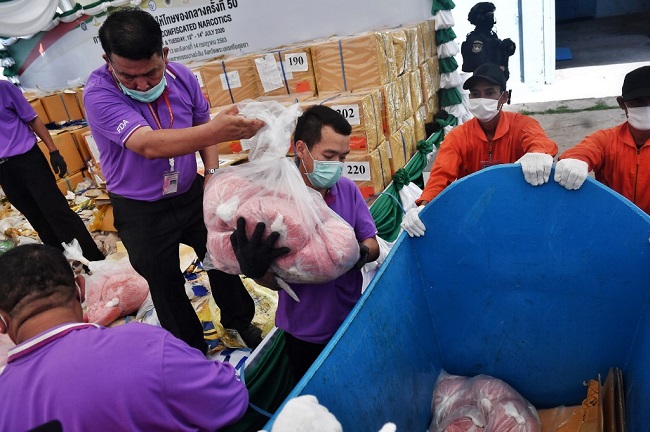
The downfall of a meth syndicate laundering tens of millions of dollars of drug money through Thai gold shops, oil and construction firms have cast rare light on the staggering scale of Asia’s narco profits — and the ruses used to hide them.
Thailand is Southeast Asia’s meth “superhighway”, with drugs from remote Myanmar labs pouring through the border destined for the local market or overseas as far as Australia, New Zealand, and Japan.
Prices have dropped as the drug labs ramp up production of yaba — the tiny caffeinated pink or green pills guzzled by Southeast Asian truck drivers to clubbers — and the more expensive and highly addictive crystal meth known as “ice”.
Millions are hooked on drugs in Thailand, where prisons are stuffed with petty dealers and addicts.
But the drug lords remain beyond reach, hidden behind a web of middlemen and complex money laundering schemes.
Authorities say they are finally ready to change the game by going after drug money sloshing through Thai banks, construction businesses, and cryptocurrency accounts.
“We have found an irregular flow in the banks of 170 billion baht ($5.4 billion) — it may not all be drugs,” Justice Minister Somsak Thepsuthin told reporters this week.
“But we are confident there is at least 12 billion baht ($388 million) in drug-related assets — drug money is being turned into gold, zinc (panels), steel rods and oil.”
Thailand’s get-tough message follows the recent unspooling of several networks, who bought oil with drug profits and traded it on international markets as well as transforming dirty money into construction materials for sale such as steel pipes, roofing, and machinery.
The main group was allegedly controlled by Daoreung Somseang, a Thai woman already in custody in a Bangkok prison on trafficking offenses.
Police allege she still ran a drug empire that spanned the country using gold shops and construction companies to clean at least $100 million cash through 113 accounts to move the money.
It is a cycle of drug production, trafficking, and laundering that generates untold billions and turns a secondary economy of cryptocurrency, supercars, and plush overseas properties.
“It’s impossible to guess the real amount these drug networks are making,” Lieutenant-General Wissanu Prasarttong-Osoth, assistant to Thailand’s police chief, told AFP.
– Filthy rich but low-key –
But the Daoreung’s dexterity in laundering shows the “scale and sophistication of the networks”, according to Jeremy Douglas of the UN Office on Drugs and Crime.
“This one is not even a super-syndicate… it’s mid-sized but is still moving a massive volume of money.”
On Friday, Thai authorities burned seized drugs worth $1.7 billion — another batch worth $800 million was incinerated in Myanmar — during an annual parade of law enforcement successes across the region.
But the record amounts are just a sliver of the money on the table for Asia’s meth lords, who emerge from drug crackdowns by raising production and piercing borders with corruption.
The UNODC estimates they are making between $30-$60 billion a year and are the biggest meth producers in the world.
The meth is produced in the “Golden Triangle” — cutting across northern Thailand, Laos, China and Myanmar — where armed rebels are the law and drug lords lease jungle labs under their protection.
The market-leading syndicate is believed to be the “Sam Gor” group, dominated by Chinese gangsters who control at least 40 percent of Asia’s meth — sending their signature tea packets stuffed with “ice” across the Asia-Pacific region.
Asian organised crime is more stealthy than its violent and showy Latin American peers, operating in anonymity across countries with long, porous borders, corruptible police, and large domestic markets of drug users.
To unwind the money trail, Thailand has been working with the US Drug Enforcement Agency (DEA), whose skills were honed in the fight with the Latin American cartels.
But crime experts warn police must be ready to follow the money wherever it leads if they are to get close to the heads of the criminal chain.
The UNODC’s Douglas added: “The message is you can’t just stop at the drug seizure.”
-AFP

0 Comments